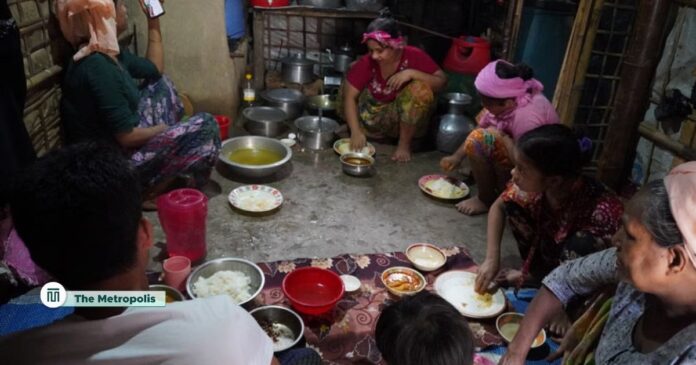The panel looking into the matter concluded Tuesday that the reason of the May helicopter crash that killed Iranian President Ebrahim Raisi was inclement weather.
The president and seven other people were killed when the chopper carrying 63-year-old Raisi and his entourage crashed on a foggy mountainside in northern Iran, resulting in early elections.
The “complex climatic and atmospheric conditions of the region in the spring” were the primary reason of the helicopter crash, according to the special board looking into the circumstances leading up to the incident, as reported by state broadcaster IRIB.
It has now become an additional burden as our family have come to live with us after escaping raids by the Arakan Army in Myanmar. During this difficult moment, we must look out for and support them,” he continued.
It is forbidden for us to labor outside for a living. The food provided by UN organizations are our only hope of survival,” Jomir remarked.
The family was observed eating on the ground in a part of their shanties that was not connected to the kitchen in the afternoon. Their main courses consisted of rice and a vegetable stew served with smashed dry chiles.
Donor organizations provide $10 vouchers each month to each registered Rohingya refugee as a food allowance, barely enough to pay the cost of food. Jomir’s family is not the only family experiencing hardship in the camps; a considerable number of refugees have just moved into the camps, escaping what they refer to as a “second wave of genocide against the Rohingya.”
The Arakan Army is primarily responsible for the current crackdown on the Rohingya, according to Kamal Hossain, chairman of the Forcibly Displaced Myanmar Nationals Representative Committee (FDMN-RC). He accused the army of killing, raping women, and setting fire to Rohingya homes. As both sides want to drive the Rohingya minority from their motherland, Kamal stated, the army of the Myanmar government are also atrociously killing them.
Kamal reports that some fifty thousand Rohingya refugees have come to Bangladesh in recent months, most of them after August 4.
The Naf River is the natural border between Bangladesh and Myanmar, and refugees cross it every night to enter Bangladesh, according to Kefayet Ullah, a young Rohingya leader and instructor. He said that because they are frequently robbed along the journey by brokers from both Bangladesh and Myanmar, they hardly ever bring cash or valuables.
Mohammed Mizanur Rahman, the Refugee, Relief, and Repatriation Commissioner (RRRC), reaffirmed that Bangladesh’s official position is to stop allowing any additional citizens of Myanmar to enter the country unlawfully. But a large number of Rohingya refugees have just recently reached the camps after leaving attacks in Myanmar, especially on August 4 and 5, when the country was unstable.
He put the total number of recent arrivals at 8,000–10,000.
“We have informed our higher authorities about the current situation and are working to arrange food assistance for the new arrivals on humanitarian grounds,” Rahman said.
UNHCR communication officer Shari Yesmin Nijman addressed the matter, saying, “The border between Bangladesh and Myanmar is still formally closed and is patrolled by Bangladesh Border Guards. We are keeping a careful eye on the situation at the border, supporting civilians escaping the fighting in Myanmar by arguing with the Bangladeshi authorities for their right to refuge, and offering support.”



